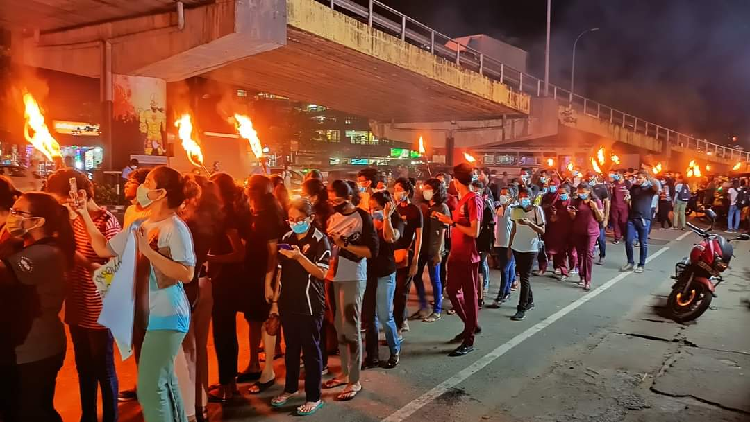Read in : தமிழ்
India’s island neighbour, Sri Lanka is facing its worst economic and political crisis in over 70 years, with food prices soaring by a record 30 percent in March 2022, alone. Basic necessities are now beyond the reach of most of the island nation’s 22 million population. Shortage of medicine, cooking gas, fuel, basic essentials and power outages have added to the nation’s burden of woes.
Protesters have taken to the streets in their thousands, island wide, demanding the resignation of President Gotabaya Rajapaksa and his government headed by his Prime Minister brother, former President Mahinda Rajapaksa. 6.9 million who voted them to power, now want them out!
The rallying call of the protesters, mostly comprising educated youth of the country is, “Go Home Gota” (Gota is a shortened version of the President’s first name) and “Go Home Rajapaksas”. They are also demanding that billions of US Dollars allegedly looted by the Rajapaksa family be returned to the people of Sri Lanka.
The concentration of power in the hands of the Rajapaksa family – the President, Prime Minister and three other key Cabinet seats – has further enraged the protesters.
Sri Lanka’s Parliament commenced debating the ever worsening economic and political crisis in the country early this week but has failed to reach a consensus on the way forward, thus far. It is becoming increasingly obvious that the government and the opposition are unable to work together within the Constitutional framework to address the growing crisis in the nation.
Government MPs are more concerned about their personal security than what ails the country. Members hurled abuse and accusations at each other while the youth of Sri Lanka continued to protest on the streets demanding the resignation of the President, Prime Minister and the government.
Appeals to the opposition to accept an invitation to join an interim government to solve the immediate problems in the country, have fallen on deaf ears, thus far. Their hunger for total political power seems far greater than a genuine desire to collectively find solutions to the burning issues faced by the nation.
In an unprecedented move, 38 Chambers of Commerce and Industry in Sri Lanka have jointly written to the President, Speaker and all Members of Parliament stressing the need for the economic crisis to be resolved urgently, to prevent a serious catastrophe.
Government MPs are more concerned about their personal security than what ails the country. Members hurled abuse and accusations at each other in Parliament while the nation continued to protest on the streets demanding the resignation of the President, Prime Minister and the government.
The embattled private sector claims, the current crises, is rapidly destroying the economy and a steady collapse of the supply chains could result in seriously disrupting both financial markets and banking systems. “If all industries, exports and other critical sectors of the economy come to a standstill, the result will be the destruction of the entire social fabric with the Micro, Small and Medium Enterprise (MSME) sector being the hardest hit,” they warn.
Therefore, the private sector has called upon the leaders of political parties and all elected representatives of the people to urgently bring about political stability by the end of this week, with a pragmatic interim solution.
The Rajapaksa led government has thus far been fighting shy of engaging the IMF but now, it is imperative that the government engages with the IMF with a sense of urgency, in order to avoid an economic catastrophe.
If the current crisis continues, it will undoubtedly turn into a spiral of violence which in turn will cause devastating damage to the people and economy of this country. Therefore, it is imperative that the powers that be act responsibly and establish an interim government to focus on the immediate issues facing the nation.
The Colombo Magistrate Court issued an order preventing former Central Bank Governor Nivard Cabraal from leaving the country, after a political activist filed a legal case against Cabraal, on charges that he too was responsible for the economic crisis in the country.
Meanwhile, the Colombo Magistrate Court issued an order yesterday, preventing former Central Bank Governor Nivard Cabraal from leaving the country, after a political activist filed a legal case against Cabraal, on charges that he too was responsible for the economic crisis in the country.
Traditionally, previous Governors of the Central Bank of Sri Lanka have been eminent economists. Cabraal however, widely regarded as a ‘Rajapaksa Oligarch’ is not an economist but a Chartered Accountant. He was the accountant of a small family owned city hotel until he took to politics and was subsequently appointed as the Governor of the Central Bank with a Cabinet rank, by the Rajapaksas.
Cabraal is widely blamed for his excessive money printing which resulted in the current forex crisis in the country. A flexible exchange rate collapsed after two years of money printing. Inflation rose to 15.1 percent in February 2022; a 13-year high, after two years of record money printing, to keep interest rates down.
Moody’s Investors Services have said, prolonged political uncertainty amid the ongoing financial crisis in Sri Lanka could thwart attempts to obtain external financing from key development partners.
Economists have predicted that the current economic situation is likely to worsen in the weeks ahead and there may be food shortages in addition to the current shortage of medicine, gas, fuel, electricity etc. This is not good news for those awaiting the New year next week, celebrated mainly by the Buddhists and Hindus in Sri Lanka.
(Sharmini Serasinghe has over 40 years of experience in print and broadcast journalism. She has written a thought provoking book, Sri Lanka: The Elusive Miracle of Asia.)
Read in : தமிழ்











